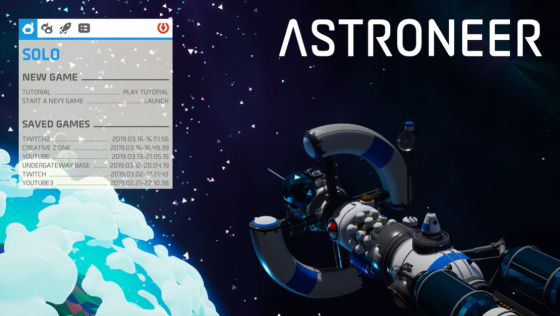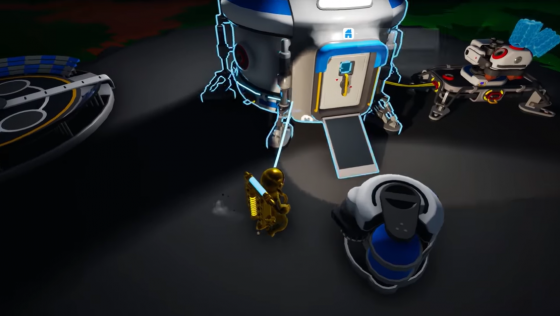
US Gamer
 13th February 2019
13th February 2019
Author: Mike Williams
Publisher: System Era Softworks
Machine: Nintendo Switch (EU Version)
Mining has never been so charming and chill.
Astroneer
Astroneer throws you onto an alien planet with your own Apollo 11 and a tool that allows you to vacuum up the environment. With that as your starting point and the intrepid feeling of exploration at your back, it's up to you to tame the planet and get back into space. When you want to, of course. Maybe have a drink and dig a tunnel in the side of the mountain for a bit. Developer System Era Softworks clearly doesn't want to rush you.
In terms of the survival genre, Astroneer is definitely on the soft side of things. The leisurely pace of Astroneer puts it closer to a game like Stardew Valley-it feels like the little brother of the current version of No Man's Sky at times-giving you a series of tasks that push you toward an end goal. The primary focus is exploration, as you push out further from wherever your shelter is located. The planets you find yourself on are randomly-generated; a series of bright, colourful alien landscapes. Mountains, plains of swaying grass, and odd-looking trees stretch out in every direction in neon greens, oranges, and blues. Astroneer looks inviting and fun, and your lone explorer bounding across the landscape never diminishes that.
There's no hunger or thirst meters to keep track of. There are resources to collect, but not having those resources rarely means you're going to die; it's mostly just a temporary roadblock to progress. You will die in Astroneer from running out of oxygen or getting attacked by alien plant life, but it rarely feels punitive. Astroneer is one of the few survival games I can just walk away from when I get distracted by life.
Your primary shelter provides power and oxygen. While you're in range of the shelter, the oxygen is free, but if you step too far away your oxygen meter begins to tick down. Survival off-grid is possible, but you won't last forever. You can expand the oxygen range through craftable tethers. These tethers are a smart bit of design, because not only do they provide oxygen, they're also a light source and tangible representation of your progress.As you expand your reach across a planet, or even into its very core, the tethers let you know where you've been and the edges of your current exploration. Together with beacons, another craftable item, you'll eventually build a network of tethers and stations throughout your current planet. Even when the darkness of the underground begins to crowd around me, I can look at my web of light as a connection to everything else I've established so far. It adds a sense of safety in treacherous situations.
Most of those treacherous situations come from the depths of the planet. To find the best resources, you'll need to dig down into the darkness below. In the caverns underneath everything you'll not only find better materials, but there's also alien life that'll kill you or dangerous drops into the unseen spaces far below. Astroneer is a relaxed experience, but the tension is at its strongest when you're off-tether in the caverns alone.
It's a shame that there's not more to find beneath the planet's surfaces though. Finding a vein of the exact resource you need or some brand-new material is great, but that excitement only lives so long. System Era has added new underground biomes and a series of alien monoliths that players can find via exploration and power-up to access something bigger, so I'm hoping that smaller unique discoveries will find their way into Astroneer at some point.Crafting is the other core mechanic of Astroneer. You'll suck up terrain with your tool, which then separates out the various materials. Soil is the bottom-level bedrock of everything: you remove it, but you can also push it back out in the environment to make bridges, ramps, or your own man-made landscapes. Sitting on top of or inside that soil are the other resources, like Resin, Quartz, Graphite, and Clay. Collecting enough of a resource creates a stack, a pluggable cube of material. These stacks pop onto the plugs on your backpack or various crafting stations, like printers, the Smelting Furnace, or the Chemistry Lab. This is survival busywork of Astroneer, but I find System Era has streamlined it over resource collection in some other games.
So you'll hunt down resources, turn them into other forms, and use that material to expand your general capabilities. Creating more crafting recipes requires research, which means breaking down stacks at a Research Chamber or scanning alien objects you find on your travels. Research creates bytes, which are the currency needed to purchase new building schematics.
Once you've figured out the basics, Astroneer has you on this slow, rolling loop of greater ability. What starts as an astronaut and a single shelter, eventually becomes a camp of crafting industry, a network of oxygen tethers, and eventually a few vehicles to help you get around. You feel like you're slowly getting somewhere in Astroneer; there's always a visual representation of most progress, even if it is just a mountain of loose resource stacks.Astroneer trips itself up in the lack of clarity in regards to resources. Without looking it up on the internet, it can be difficult to know where a resource goes, or what else you can turn it into. Quartz or Organic material added to the Smelting Furnace becomes Glass or Carbon, but there's little in Astroneer that tells you that. The built-in Astropedia provides some more clarity, but it's missing answers to certain questions and it's hidden within the menu, instead of being readily available. System Era has definitely improved in this area since the first time I played back in 2016 when it debuted in Steam Early Access, so my guess is this will probably become less of an issue in the future.
Once you have everything down though, Astroneer is a leisurely experience. There's tension and danger, sure, but it's secondary to the low-key vibe the game presents. Instead of swinging a tedious mining pick or laser in another survival game, Astroneer is built to make things go quicker. System Era wants you crafting more structures and exploring more caves. You'll find yourself forging mountaintop camps and underground bunkers. You'll build bridges to cross gaps and ramps to do sick flips in your buggy. Yes, there's an end goal of getting off the planet, but Astroneer doesn't rush you there and that's its greatest strength if you're playing alone.
You don't have to be alone though. Astroneer supports cooperative play for up to four players. The feeling of airy exploration and industry is improved when you have a few like minded friends at your side. Perhaps you'll create a tower into the upper atmosphere and all jump off. Maybe you'll go diving into the planet's core to plunder its hidden secrets. Or you'll make a track and partake in competitions like a soft version of a Nintendo kart racer. It's whatever you and your friends can come up with.There's a goal to any planet in Astroneer-collect the resources to jump to the next planet-but that's not what Astroneer is about. It's akin to the first day of a long vacation. There are things you might have on your to-do list, and you'll get them done, but unwinding is the real focus. A great session of Astroneer has you progressing a bit, but mostly just wandering around, getting into some trouble, and having fun. It's the feeling of your astronaut bounding across the planet's surface while the sun is high, attached to your tether line and just watching the grass sway. Or using your Terrain Tool to suck up errant soil in the dark depths of a planet, with only your headlamp and whistled tune to keep you company.
Astroneer has multiple planet types, new suits and colour schemes to unlock, and a host of secrets, but what makes it work is how chill it is. I play Stardew Valley on Switch because it's relaxing to occasionally check in on my farm and just do some busy work. Astroneer is more freeing than even that; it doesn't ask for much except your time, offering up hours of enjoyment with friends or strangers. Even the ambient soundtrack backs up the general vibe of the gameplay. I may have quibbles here and there, like the lack of in-game info about crafting materials, the occasional weird physics bug, or a desire for some more customization options and additional things hidden within each planet, but it's still a lovely little game. It's the type of game I tend to play while I'm watching TV, and frankly, that's great for me. Astroneer may not be for everyone, but if you want to relax and rearrange a planet, there's no better time.
Verdict
Astroneer is definitely on the soft side of the survival spectrum. It looks inviting and fun, whether your lone explorer is bounding across the colourful landscape or mining deep within underground caves. Collecting resources and crafting them into new tools is the main focus, and Astroneer falters in not having more interesting things to find within each planet. In the end though, it's a lovely little game if you want to survive without all the pesky hunger and thirst you find in other games.

























